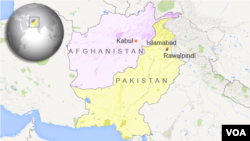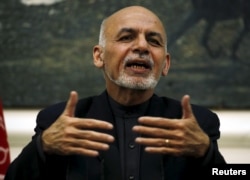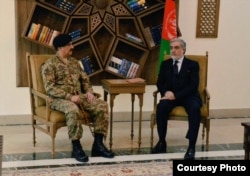Pakistan is to host a key meeting of top Afghan, US and Chinese officials on Monday. Participants are tasked to set the stage and determine dates for resuming peace talks between the Kabul government and the Taliban to end years of hostilities in Afghanistan.
The expansion of the Taliban insurgency in Afghanistan during the past year has fueled regional and international concerns the upcoming spring fighting season may lead to even more bloodshed and instability in the war-shattered country.
Afghan and Pakistani officials say four-nation talks in Islamabad are to determine a “roadmap” and define limits for reviving a peace process.
U.S. Ambassador to Islamabad David Hale says an Afghan peace process is a difficult issue.
“The goal, of course, is an Afghan-led, Afghan-owned process, but we all know that Pakistan, the United States, other countries, China, our partners in the Gulf, all have ways in which they can influence positively this outcome," he said. "Now the even harder part starts of actually getting going, and we are in that sort of preparatory phase now of having discussions behind the scenes on just how we get organized and develop a strategy here to bring it home.”
There is widespread skepticism about whether the Taliban is ready to give up violence and reengage in a “result-oriented” peace dialogue with the Afghan government.
Ghani optimistic
Speaking Saturday in Kabul, Afghan President Ashraf Ghani sounded optimistic about the four-nation effort.
Ghani said the internationally-monitored discussions beginning Monday will enable all sides to differentiate between insurgents who want reconciliation and those who oppose it.
Without naming Pakistan, President Ghani said “this time we have received assurances that force and other means will be used against non-reconcilable” Taliban militants.
Pakistani security analyst Simbal Khan has just returned from Kabul, where she says Afghans are eager to seek a truce with the Taliban before spring fighting.
“The leadership of the Taliban still resides in parts of Pakistan, so it is very difficult for Pakistan to deny that anymore," she said. "But what would be expected of us would be that in the case of those who refuse to be reconciled, that Pakistan's government, Pakistan's military, will act against those, either by evicting them, either by arresting them and handing them over to the Afghan government or by eliminating them.”
Bringing Taliban to the table
Khan says the Afghan government has not made it clear what political and economic incentives it wants to bring to the table as a reward for the Taliban to cease hostilities.
“The Taliban right now are resurgent," she said. "They are winning more and more territory inside Afghanistan. They have shown their military power, they have attacked district centers, they have taken over district centers and they are poised now to expand that, and we have seen the performance of the Afghan government quite weak.”
Pakistan hosted a preliminary round of direct talks between the Afghan government and the Taliban last July. The process was halted after it was revealed Taliban leader, Mullah Omar, had died two years ago. Internal rifts have since plagued the Taliban because some commanders refuse to pledge allegiance to Omar’s successor, Mullah Akhtar Mansoor.
Taliban officials have not clearly stated the group is ready to come to the table for talks. They also dismiss suggestions pressure from Pakistan may push them to the negotiation table, insisting any such attempts will be counterproductive for the Afghan peace efforts.







